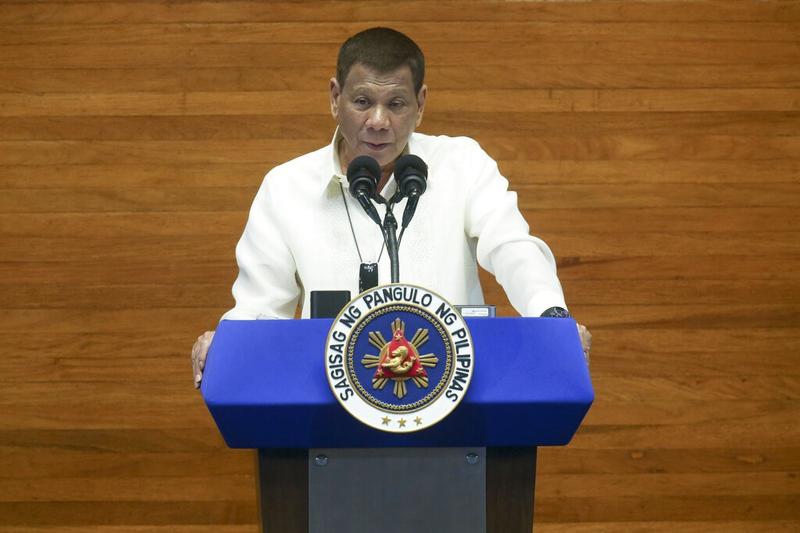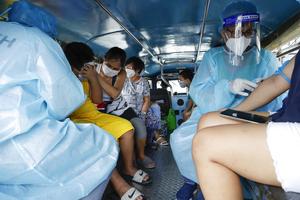 In this photo provided by the Malacanang Presidential Photographers Division, Philippine President Rodrigo Duterte delivers his State of the Nation Address (SONA) at the House of Representative in Metro Manila, Philippines, July 27, 2020. (SIMEON CELI JR. / MALACANANG PRESIDENTIAL PHOTOGRAPHERS DIVISION VIA AP)
In this photo provided by the Malacanang Presidential Photographers Division, Philippine President Rodrigo Duterte delivers his State of the Nation Address (SONA) at the House of Representative in Metro Manila, Philippines, July 27, 2020. (SIMEON CELI JR. / MALACANANG PRESIDENTIAL PHOTOGRAPHERS DIVISION VIA AP)
The Philippines has sought China’s help to manage the pandemic as the Southeast Asian country continues to battle the growing novel coronavirus infections.
“About four days ago, I made a plea to (China’s) President Xi Jinping that if they have the vaccine, can they allow us to be one of the first or if (it) is needed, if we have to buy it, that we will be granted credit so that we can normalize as fast as possible,” Philippine President Rodrigo Duterte said.
Duterte made the remarks during his annual address to the nation, on July 27, at the opening of the 18th Congress – the national legislature – of the Philippines.
About four days ago, I made a plea to (China’s) President Xi Jinping that if they have the vaccine, can they allow us to be one of the first or if (it) is needed, if we have to buy it, that we will be granted credit so that we can normalize as fast as possible.
Rodrigo Duterte, Philippine president
There were 82,040 confirmed cases in the Philippines as of July 27, according to the country’s health department. This is one of the highest figures in Southeast Asia. Roughly 30 percent of the infected people have recovered.
Duterte, who is in the fourth year of his six-year term, said the country’s economic gains “were put to a test when the pandemic suddenly struck the global community”. But he decided “to prioritize life over other considerations”, explaining the rationale for the government’s lockdown and social distancing measures.
ALSO READ: Duterte says virus intervention prevented millions of cases
“According to experts, the interventions that the government had put in place prevented as much as 1.3 to 3.5 million infections. To me, even if the numbers were much lower, it would still be and would have been worth the sacrifice(s) we made,” he said, adding that the government is ramping up the country’s testing capacity.
Duterte said there are now 93 accredited testing laboratories across the country, noting that health officials aim to conduct 1.4 million tests by the end of this month.
The Philippine president has also urged the Congress to pass key measures that can “facilitate the country’s economic recovery”.
READ MORE: Pandemic threatens to burst Manila's online gaming bubble
These measures, called the Bayanihan to Recover as One Act, will earmark 140 billion pesos (US$2.8 billion) for the purchase of test kits and extend assistance to labor, transportation, tourism, and agriculture sectors; the Corporate Recovery and Tax Incentives for Enterprises (CREATE) Act, which will cut the corporate income tax rate from the current 30 percent to 25 percent; and the Financial Institutions Strategic Transfer (FIST) Act, which will allow banks and other financial institutions to dispose of and transfer bad loans to asset management companies.
Analysts said the Philippines has a strong fiscal position and they expect the government will use it to mitigate the impact of the pandemic on the country’s economy. Philippines’ GDP contracted by 0.2 percent in the first quarter and the country’s economic managers forecast that this year’s GDP might decline as much as 3.4 percent – the first contraction in more than 20 years.
“The Philippines entered the pandemic with a solid fiscal position with a low debt level and a decent deficit-to-GDP ratio. What we need from the government is their willingness to put their solid fiscal position to good use by spending (and at times borrowing) their way back to growth,” Nicholas Antonio Mapa, senior economist at the Netherlands-based investment bank ING, told China Daily.
 Health workers collect blood samples inside a jeepney bus at a free COVID-19 drive-thru testing facility in Manila, Philippines, July 20, 2020. (AARON FAVILA / AP)
Health workers collect blood samples inside a jeepney bus at a free COVID-19 drive-thru testing facility in Manila, Philippines, July 20, 2020. (AARON FAVILA / AP)
Mapa said he supports the passage of the Bayanihan to Recover as One Act as it will boost sagging domestic consumption and improve the public healthcare system.
Ruben Carlo Asuncion, chief economist of Union Bank of the Philippines, said the passage of bills like CREATE will have a more lasting impact on the economy.
“This is clearly about a ‘not wasting a crisis’ mindset. This bill will help the government to improve its industrial development policy and attract the necessary investments, both local and foreign,” Asuncion said.
Duterte has also urged the Congress to pass key measures, called the Bayanihan to Recover as One Act, that can “facilitate the country’s economic recovery”
The Philippines was one of world’s fastest growing economies, and expanded by an average of 6.6 percent in the past few years. It is also fiscally strong – the country’s external debt was 19.67 percent of Gross National Income in the first quarter. The Department of Finance said the country’s debt ratio is lower than its Asian peers which have an average 33.6 percent debt ratio.
But that growth trajectory was halted when the pandemic struck, with the economy likely to have veered towards a technical recession in the first half of the year. The Philippines is yet to issue its second quarter economic report, but Acting Socioeconomic Planning Secretary Karl Kendrick Chua has said the second quarter economic contraction would be deeper than in the first quarter, according to a report filed by the Philippine Daily Inquirer.
READ MORE: ASEAN leaders urge cooperation to rebuild economies
Analysts believe that the government can also do more to address the pandemic.
Herman Joseph Kraft, associate professor of political science at the University of the Philippines, said the “underwhelming part” of Duterte’s address is the paucity of details about the measures to mitigate the impact of the pandemic on ordinary Filipinos.
“Ramping up testing is important but (he didn’t say) how it will be done. He only said that (the country now has) 93 testing centers, and intends to increase the number of tests administered,” Kraft said.
Mapa of ING was surprised that the proposed 1.5 trillion-peso stimulus package under the Accelerated Recovery and Investments Stimulus for the Economy of the Philippines (ARISE) bill was not mentioned in Duterte’s speech. The stimulus package aims to fund wage subsidies, cash-for-work programs for displaced workers, mass testing, and financial assistance to small businesses.
The ARISE bill was already approved by the House of Representatives but is yet to be discussed in the Senate.
“I was hoping for support for ARISE, as this bill is our best bet to combat the fallout from COVID-19 as it tackles many issues and covers many bases to help generate domestic demand,” Mapa said.


